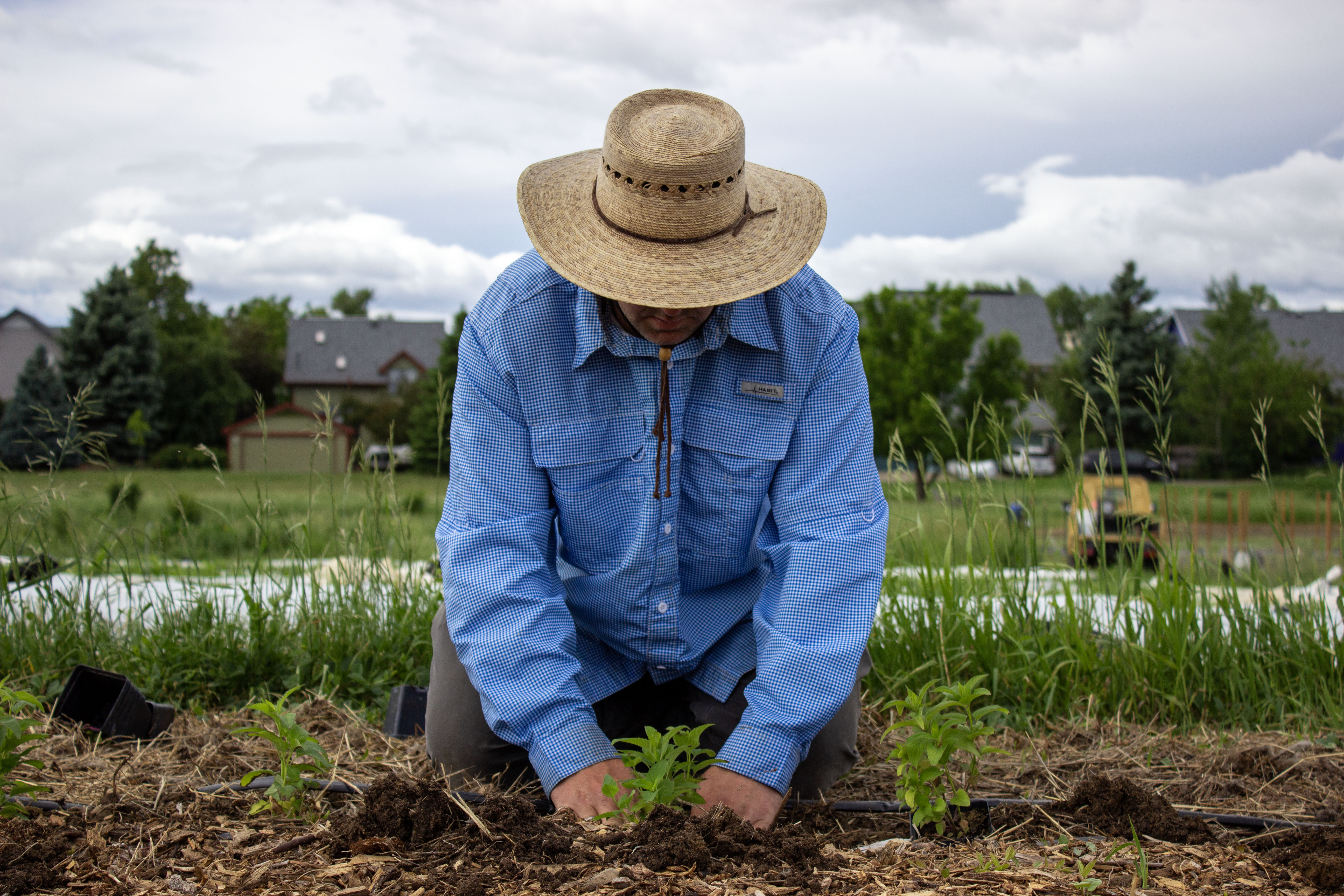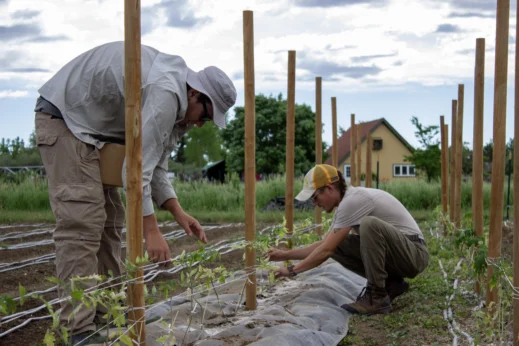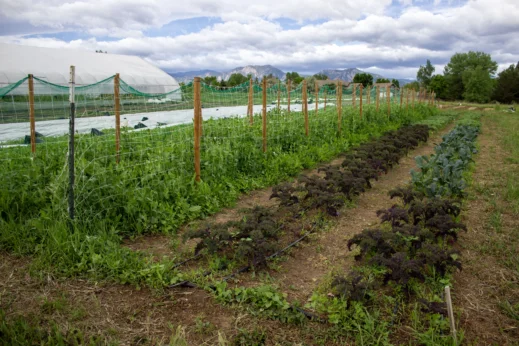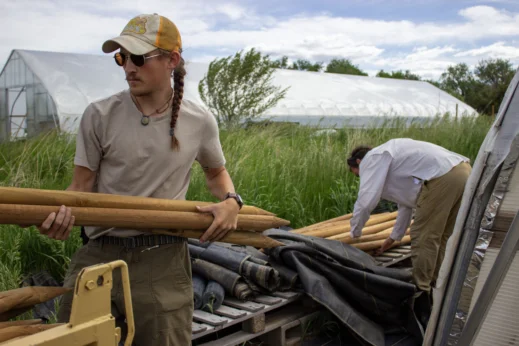Young Farmers Dig Into Land
These new farmers get by with a little help from their friends.
Young Farmers Dig Into Land
These new farmers get by with a little help from their friends.

Kevin Reiss plants one of Friends Farm's perennial bedsby Claire Duncombe.
This story is part of our Future Farmers series, highlighting the joys and hurdles of a career in agriculture today. You can read more of this series here.
Sam Rudman, one of the first-year farmers of Friends Farm in Lafayette, Colorado, says covering a field with fertilizer shortly before 60-miles-per-hour winds started up was definitely one of his many “rookie mistakes” as a new farmer. He clearly remembers the day in February 2024 when winds threatened to blow away hundreds of dollars in supplies and hours of hard work as a big wakeup call.
“We got lucky,” he laughs. “And that is going to be our strategy for the rest of the year going forward, to remain lucky in regards to Mother Nature.”

But the Friends Farm team isn’t counting on luck alone. The three team members—Rudman, Oliver Aurand and Kevin Reiss, who met in 2023 on a nearby farm—bring backgrounds in soil science, anthropology and just over a decade of combined field hand experience. They have also tapped into an innovative community network to find land and mentorship. “Land access is the top challenge cited by current farmers, aspiring farmers and those who have stopped farming,” writes the National Young Farmers Coalition in a 2022 report.
Friends Farm is not technically located on agricultural land. The two-acre vegetable operation is owned by Nyland Cohousing Community, a 42-house community established with the aim of creating connection and supporting sustainable ideals. A former member started the farm a decade ago but became disillusioned by the inability to make a profit. In 2023, Waves of Grain Food Coop leased the land to continue the organic farm in support of its mission to provide fresh and affordable produce to communities along the Front Range of the Rocky Mountains.
“Solo full-time farming two acres is an insane thing to do,” says Waves of Grain co-owner Red Clifford , especially while also running a coop. Around that time, Clifford learned of the Friend Farm crew, who were looking for land to farm at the same time Clifford was trying to find help.
It was a serendipitous moment that helped inspire Waves of Grain to use its resources to establish an incubator farm. The coop continued to lease the acreage from the cohousing community and subsidized rent for Friends Farm. It would also help sell a portion of the farm’s produce at regional farmers markets.
Waves of Grain also started mentoring the new farmers, sharing insights about the particularities of the land, preparing the produce for market and helping build the relationship with Nyland residents. The farmers appreciate the practical knowledge Clifford shares from their own mistakes the previous season.
Waves of Grain also hopes to supplement some of the supply chain aspects of a farmer’s job, so the farmers can focus more on farming. During the growing season, a farmer is often focused on the small space of ground before them. Their “view is a 36-inch bubble,” says Clifford. “It’s like basically where they’re looking on the ground to weed.” So far this season, Friends Farm has had particular success selling its salad greens and hakurei turnips.

But Friends Farm was also founded on the idea that farming is about more than cultivating vegetables. Aurand’s background in anthropology helped create a focus on nurturing community. So far this season, the farm has hosted nine classes covering topics such as edible landscaping and native gardening as well as community farm days, during which Nyland residents and others help work the farm and learn about growing food. In addition, the farm provides a CSA program to 20 of the Nyland residents.
Friends Farm has thrived because of help from its community, but even with support, it has learned that farming always comes with challenges. The farmers were spreading fertilizer on that windy day in February to amend a clay soil that had been compacted by years of heavy machinery use. A large weed seed bank caused problems in past years, such as the bindweed that consistently outcompetes crops. And the farm relies on municipal water for much of the season, resulting in water bills in the thousands of dollars, says Rudman.
“The concerns are not that you’re going to do a bad job and you’re going to run a bad farm,” he says. “It’s that things can go wrong. The weather can screw you over. Small mistakes can be very costly.”

The learning curve remains a challenge, the farmers agree. So far this year, they’ve explored more efficient ways to run the farm and fine-tuned their use of tools such as the Jang seeder, which helps speed up and space out seeds. They’ve also tried relay cropping experiments such as planting tomatoes and peppers before the other was finished growing to help optimize their planting space. Their efforts have yielded varying degrees of success. They consider the support from Waves of Grain and Nyland a leg up. Just having the buildings and irrigation set up was helpful, says Rudman. And Nyland residents have often helped fix problems with the water system.
The relationship between Nyland, Waves of Grain and Friends Farm works because of its reciprocal model, says Clifford. Nyland exchanges its land for a secure food source, and Waves of Grain provides its resources for a supply of food today and an investment to support the farming community and the food they will grow into the future.
This story is part of our Future Farmers series, highlighting the joys and hurdles of a career in agriculture today. You can read more of this series here.
Follow us
This work is licensed under a Creative Commons Attribution-NoDerivatives 4.0 International License.
Want to republish a Modern Farmer story?
We are happy for Modern Farmer stories to be shared, and encourage you to republish our articles for your audience. When doing so, we ask that you follow these guidelines:
Please credit us and our writers
For the author byline, please use “Author Name, Modern Farmer.” At the top of our stories, if on the web, please include this text and link: “This story was originally published by Modern Farmer.”
Please make sure to include a link back to either our home page or the article URL.
At the bottom of the story, please include the following text:
“Modern Farmer is a nonprofit initiative dedicated to raising awareness and catalyzing action at the intersection of food, agriculture, and society. Read more at <link>Modern Farmer</link>.”
Use our widget
We’d like to be able to track our stories, so we ask that if you republish our content, you do so using our widget (located on the left hand side of the article). The HTML code has a built-in tracker that tells us the data and domain where the story was published, as well as view counts.
Check the image requirements
It’s your responsibility to confirm you're licensed to republish images in our articles. Some images, such as those from commercial providers, don't allow their images to be republished without permission or payment. Copyright terms are generally listed in the image caption and attribution. You are welcome to omit our images or substitute with your own. Charts and interactive graphics follow the same rules.
Don’t change too much. Or, ask us first.
Articles must be republished in their entirety. It’s okay to change references to time (“today” to “yesterday”) or location (“Iowa City, IA” to “here”). But please keep everything else the same.
If you feel strongly that a more material edit needs to be made, get in touch with us at [email protected]. We’re happy to discuss it with the original author, but we must have prior approval for changes before publication.
Special cases
Extracts. You may run the first few lines or paragraphs of the article and then say: “Read the full article at Modern Farmer” with a link back to the original article.
Quotes. You may quote authors provided you include a link back to the article URL.
Translations. These require writer approval. To inquire about translation of a Modern Farmer article, contact us at [email protected]
Signed consent / copyright release forms. These are not required, provided you are following these guidelines.
Print. Articles can be republished in print under these same rules, with the exception that you do not need to include the links.
Tag us
When sharing the story on social media, please tag us using the following: - Twitter (@ModFarm) - Facebook (@ModernFarmerMedia) - Instagram (@modfarm)
Use our content respectfully
Modern Farmer is a nonprofit and as such we share our content for free and in good faith in order to reach new audiences. Respectfully,
No selling ads against our stories. It’s okay to put our stories on pages with ads.
Don’t republish our material wholesale, or automatically; you need to select stories to be republished individually.
You have no rights to sell, license, syndicate, or otherwise represent yourself as the authorized owner of our material to any third parties. This means that you cannot actively publish or submit our work for syndication to third party platforms or apps like Apple News or Google News. We understand that publishers cannot fully control when certain third parties automatically summarize or crawl content from publishers’ own sites.
Keep in touch
We want to hear from you if you love Modern Farmer content, have a collaboration idea, or anything else to share. As a nonprofit outlet, we work in service of our community and are always open to comments, feedback, and ideas. Contact us at [email protected].by Claire Duncombe, Modern Farmer
June 27, 2024
Modern Farmer Weekly
Solutions Hub
Innovations, ideas and inspiration. Actionable solutions for a resilient food system.
ExploreExplore other topics
Share With Us
We want to hear from Modern Farmer readers who have thoughtful commentary, actionable solutions, or helpful ideas to share.
SubmitNecessary cookies are absolutely essential for the website to function properly. This category only includes cookies that ensures basic functionalities and security features of the website. These cookies do not store any personal information.
Any cookies that may not be particularly necessary for the website to function and are used specifically to collect user personal data via analytics, ads, other embedded contents are termed as non-necessary cookies.